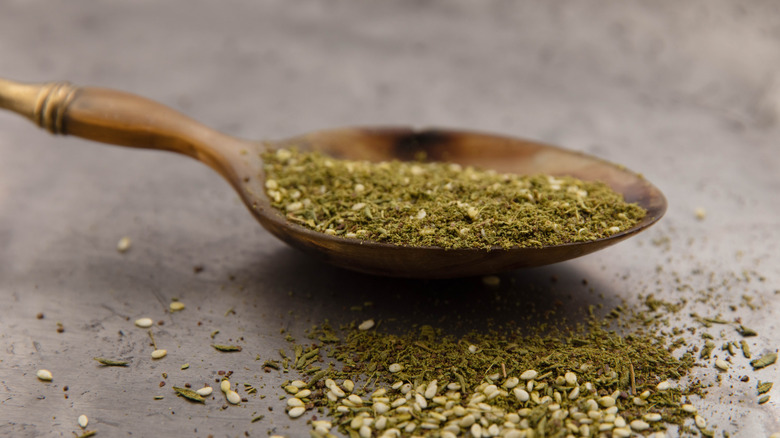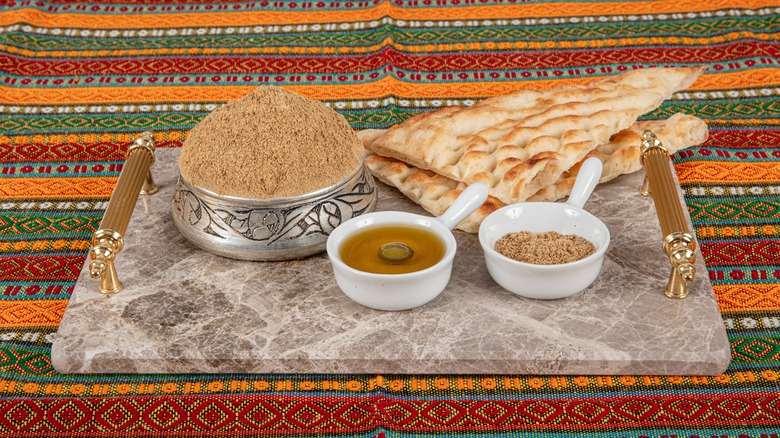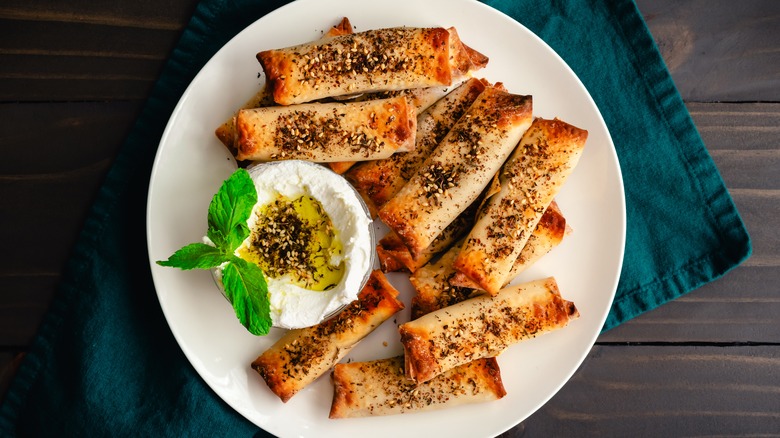What Is Za'atar Seasoning Really Made Of?
A salty, savory, layered spice blend, za'atar enhances the flavors of every dish it's added to. An ancient staple of Levantine cuisine, the spice mix today has made its way from kitchens in Lebanon, Syria, and Palestine to becoming a hit across kitchens worldwide. You may recognize it as the trending addition to marinades, or the earthy spice that is perfection when dusted on pita chips.
Za'atar recipes differ regionally and even house-to-house. The spice mix takes its name from the Arabic word zaatar, which refers to the wild herb hyssop AKA wild thyme – the star of the mix. The most common za'atar combination consists of hyssop, sumac, and roasted sesame seeds. However, marjoram, oregano, or thyme can be used as replacements when the wild herb can't be sourced. Za'atar mixes can also include dill, orange zest, coriander, or cumin, adding fruity or more spicy notes depending on each extra spice or seasoning.
Za'atar varieties often differ in color and texture, depending on how finely ground the spices are and what each mix has to offer. The depth and variety of this spice blend are what lend to its versatility in all sorts of recipes.
The history and possible health benefits of za'atar
Za'atar has been an indispensable part of Middle Eastern cuisine for centuries, sprinkled onto breads and vegetables and mixed into a variety of dishes. It was popular across the region since ancient times, and traded along with flavored salts during the Ottoman Empire. The central herb hyssop is even mentioned several times in the bible as a cleansing herb.
According to NPR, the 12th-century Jewish philosopher and physician Maimonides, who was born in Islamic Spain and traveled much of the Middle East in his lifetime, used za'atar almost medicinally, recommending it as a cure for all sorts of illnesses and malaises. And it turns out he likely wasn't far off-base: Modern nutritionists state the many ingredients in za'atar may have antioxidant and anti-inflammatory effects.
A 2010 study by the British Journal of Nutrition notes that some ingredients may lead to increased levels of dopamine and serotonin, and a 2022 study in the Journal of Functional Foods found that za'atar components "modulate gut microbiota, oxidative stress, chronic inflammation, and obesity." All this means that eating za'atar regularly could possibly leave you feeling happier and maybe even reduce your risk of disease.
In recent years, za'atar has appeared nearly everywhere, with the savory blend gaining an almost cult-like status in social media recipes from bagels to babka to tomato salad. Za'atar's growing popularity in the Western world can be seen as a result of its social media trendiness and the proliferation of Arab and Middle Eastern chefs sharing their traditional recipes.
The dishes where za'atar seasoning shines
One of the most popular ways to eat za'atar is with fresh and fluffy flatbread. After dunking it into homemade olive oil, you can then dip the bread into a bowl of za'atar. You may also recognize the spice blend as the keystone of traditional Lebanese man'oushe, a pizza-like flatbread with the spice baked in for a heavenly crunchy finish.
But the spice can be used in more simple ways, too, like sprinkled on top of popcorn or used to create elevated za'atar-dusted vegetable chips. It can be mixed into meatballs or sprinkled on top of a Mediterranean salad. It also has great potential when mixed with olive oil for a paste on top of savory pastries, or as a marinade for a zingy za'atar and citrus oven-roasted chicken. Sprinkle the spice on top of your next batch of sweet potato fries with avocado mayo for another tasty twist, or add on top of a galette that features seasonal vegetables.
If you're looking for a particularly elevated dish, try out this recipe for crispy-creamy za'atar pommes soufflées, stuffed with labneh yogurt and sprinkled with the ever-delicious spice. No matter what you're cooking, it for sure pays off to have some za'atar in your kitchen to spice things up — just about any dish can benefit from the ancient and earthy blend.



